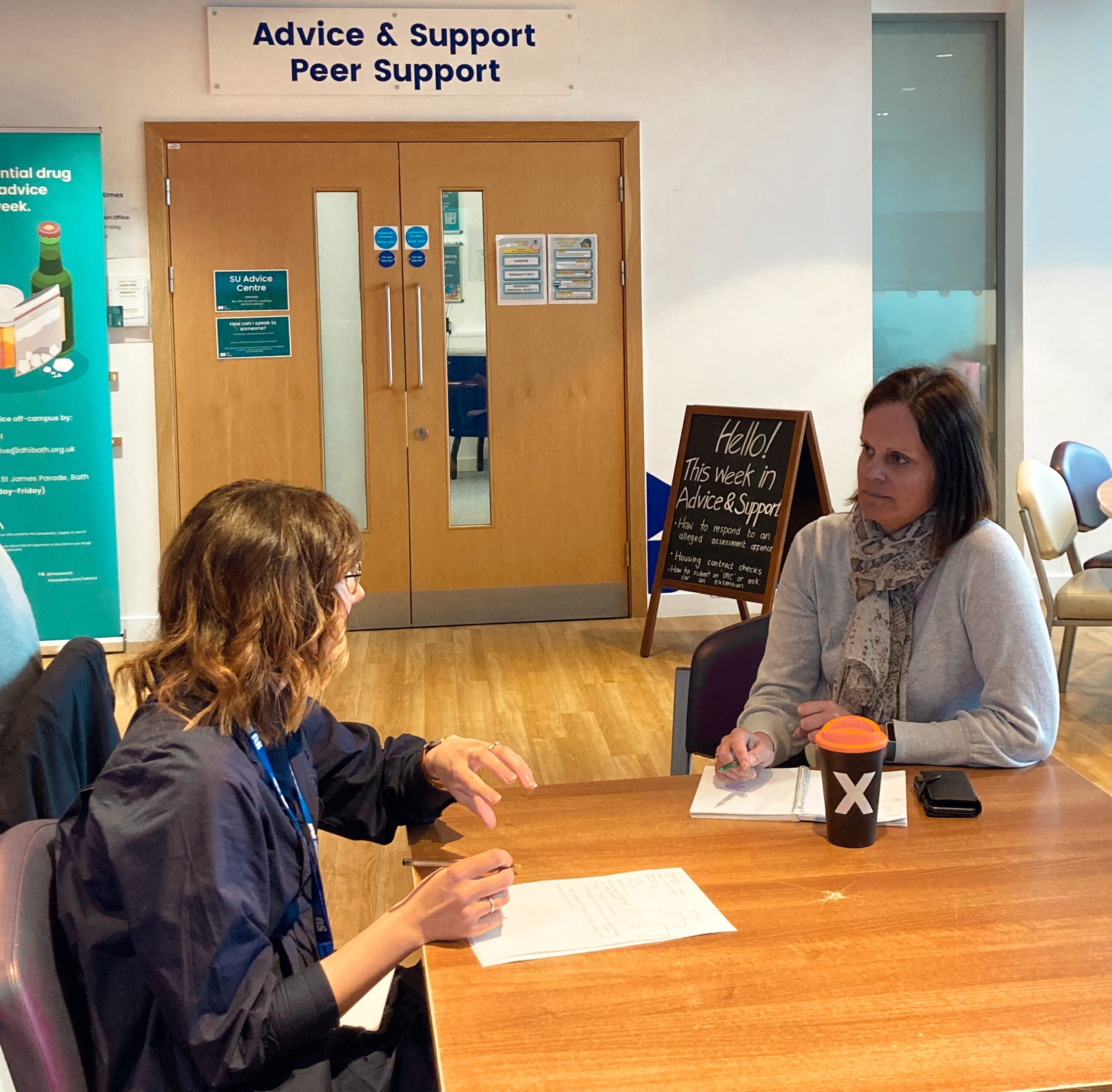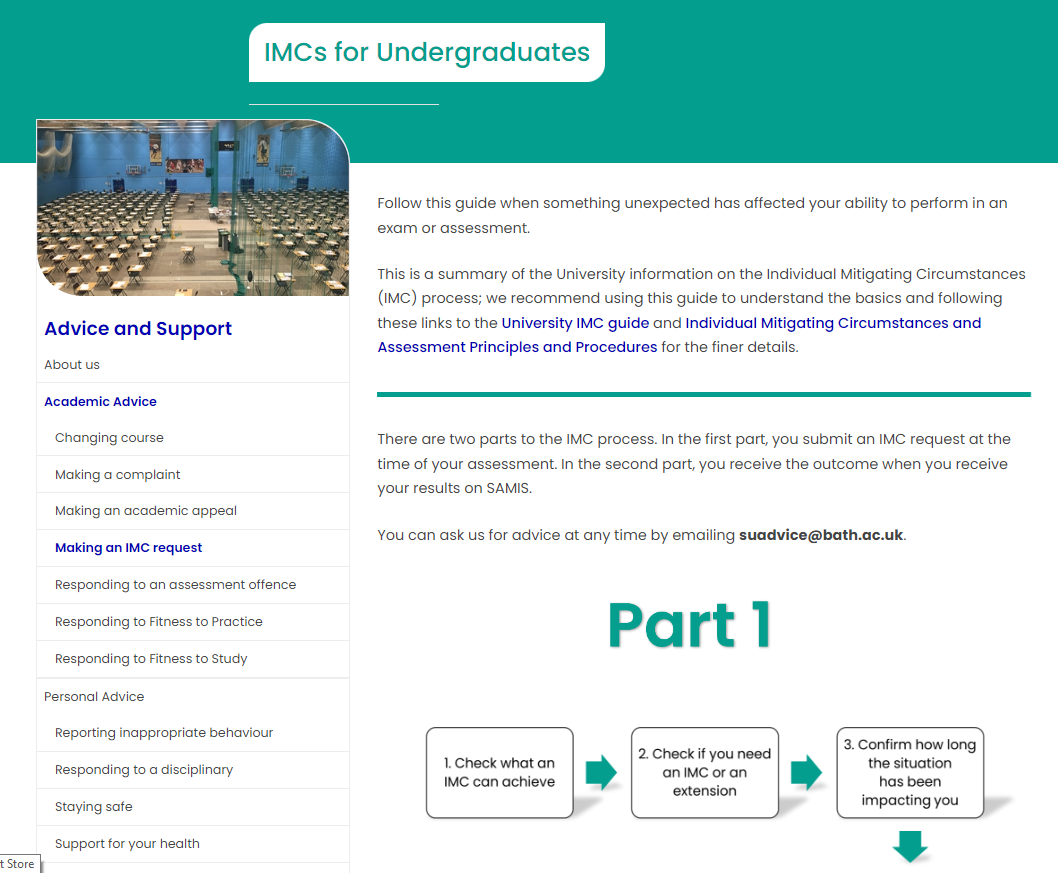For my latest blog about support for our students, I visited the Students' Union and spoke with Helen Constance (Advice & Support Manager) and her team about the vital independent advice service they provide our students and how this, in turn, helps University staff with their work.

Cassie (CW): Hi Helen, tell me something I don’t know about The SU Advice Team?
Helen (HC): Hi Cassie, not many people know we’re the only Team who provide fully independent and impartial advice to around 1,200 students a year. By independent I mean we’re not part of a University Team or Department. We work with students from every Faculty and at all levels of study, including PGRs and recent graduates. Can you guess how much demand for our service increases each year?
CW: I have no idea, 5%?
HC: It’s more like 11%, equivalent to an extra 130 students looking for independent advice (see Figure 1). Of the 1,173 students who contacted in 2021/22, over 65% asked for advice on academic processes and policies, including mitigating circumstances (IMCs) academic appeals and assessment offences. This trend is replicated across the sector; last week the Office of the Independent Adjudicator reported a record high in the number of complaints received in 2022 (n=2,850 including academic appeals, up 3% from 2021).

Figure 1. Students seeking support from The SU Advice Team increases annually, particularly for academic advice.
CW: That’s more than I thought. Are students asking their Departments for advice too?
HC: Yes. We usually work with students who have been referred to us by their Personal Tutor or Director of Studies for advice on a process, like how to structure an IMC statement or what evidence to include in an academic appeal. We know academics are feeling the pressure of being asked for more advice on increasingly complex issues, including mental health. I’d like them to know we’re here to make that workload more manageable, especially for processes lasting several months.
CW: If students are talking to their Department, do we really need an independent advice service?
HC: I like your challenge! Our independence means we work with students who feel uncomfortable disclosing issues to their Department, perhaps due to cultural differences in talking about mental health or worries about challenging authority. Sometimes we support students who are struggling to trust the University in a Fitness to Study or assessment offence investigation; our independent support can make the difference between someone withdrawing or engaging with the process. Part of our support is understanding mistrust and sharing anonymous evidence with Departments, like Registry, to help reduce barriers for students in future.
CW: Do you offer the same support as The University Wellbeing Team?
HC: We’re quite different. Our advice is focused on supporting students through processes and policies, rather than specialist support with mental health. If a student’s anxiety is impacting their work, we explain the process to ask for an extension or mitigating circumstances and support them to cope with the outcome. We’re fortunate to have 3 Advisors who get the balance between advice and mental health support right; this comes from their combined professional experience of nearly 80 years! The Wellbeing Team don’t usually offer detailed advice on an academic process but might use their clinical training to give someone the specialist help to manage their anxiety.
CW: Imagine I’m a personal tutor. How can your Team make my workload more manageable?
HC: Ok, let’s assume you support 3 people at different stages of their degree. Firstly, it’s May and someone very close to one of your tutees dies unexpectedly in the middle of exams. You could use this link to our simple IMC guide (see image below) to refresh your knowledge of the process and explain how an SU Advisor can support your tutee to structure their statement and evidence. We review about 170 IMC submissions a year and have a good idea what IMC Panels are looking for.

Screenshot of our simple guide to IMCs.
Secondly, it’s July and your final year tutee is distressed because their degree classification is lower than they expected. They tell you they had serious mental health challenges they haven’t disclosed which impacted their final assessments. You could use this link to our academic appeals guide to complement your understanding of the process and explain how an SU Advisor can support your tutee through the appeals process, which can take months. Our Team of 3 Advisors are exceptionally skilled at supporting around 200 students to submit an appeal each year.
Finally, it’s August and your second-year tutee is accused of colluding in their end of year exams. They ask you what to expect from the investigation and what the implications could be for their degree. You could refer them to our guide to assessment offences, which will be published on our webpages in May.
CW: Thanks, those guides look easy to navigate. I’m playing devil’s advocate but why should someone signpost to your guides instead of the University webpages or speaking directly to their Director of Studies?
HC: I’m glad you asked. We wrote our guides with two questions in mind:
- Can we help students understand the basics of a process in 10minutes? Many students are experiencing one of the five stress responses when they need advice (fight, flight, fawn, flop or friend) and need a simple guide before they can engage with more detailed webpages or policies.
- Can we reduce the workload of Directors of Study and Personal Tutors? We thought giving students a basic level of understanding before meeting staff might increase the efficiency and effectiveness of your detailed conversations.
Each of our guides starts by recommending the University webpages and policy, and we always ask students if they’re talking to their DoS and Personal Tutor. If they’re not, we sensitively explore the reasons and work with the student to break down any barriers.
CW: What if I supervise a Masters or PhD researcher, are you still able to help?
HC: Absolutely. Let’s imagine it’s December and your Masters student has received their degree outcome, appealed the result and discovered their appeal was unsuccessful. You could use this link to our academic appeals guide for PGTs to complement your understanding of Stage 2 of the appeals process and explain how an SU Advisor can support them. The same applies to a PhD researcher who has unsuccessfully appealed the outcome of their viva and wants this decision to be reviewed.
Despite this, only around 60 PGRs and 140 Masters students approach us for advice each year. I’d like more postgraduates to know we understand the nuances of the milestones and pressures they experience and are able to give them independent advice, sometimes in collaboration with a PGR Independent Advisor.
CW: We’ve focused on academic advice because of exams and assessments. Do you offer any other type of advice?
HC: Yes, about 400 students a year ask us for advice on processes and policies related to personal issues (e.g. misconduct or disciplinaries) housing issues or complaints about the quality of their academic experience. For example, if someone is responding to an allegation of harassment or assault, we provide independent, non-judgemental advice and support throughout the difficult process which can last months.
CW: Thanks Helen. I think I’m sold on the value of the SU Advice Team but what do students think?
HC: That’s a great question to finish. I’m exceptionally proud of my Team and would like to thank the anonymous student who recently shared their experience of working with us:
"The SU Advice Team have been an essential part of my university experience. It opened me up to engaging with their recommendations and having a positive university experience. Not that everything was always positive, but in a way that when there was an issue, I knew exactly what to say and do to get it sorted on my terms. University felt less like something that happened to me and more like something I was participating in."
Further information:
Students can contact the SU Advice Team between Monday-Friday (9am-5pm) by emailing suadvice@bath.ac.uk. All emails are treated confidentially and only read by an Advisor. We’ll reply with some initial advice, usually within 1 day, and can offer 1:1 meetings online or in-person. Students don’t have to be on campus to talk to us.
Information about the PG Independent Advisors can be found here: The Independent Advisor Service for Postgraduate Research Students (bath.ac.uk)
More data from the OIA on the types of complaints students are raising can be found in here: OIA Annual Report 2022 (oiahe.org.uk)
Respond
